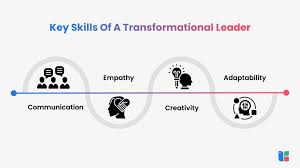Introduction:
Mentorship has always played a pivotal role in personal and professional development, yet its profound impact on shaping transformational leaders and successful teams cannot be overstated. In today’s fast-paced, ever-changing world, leadership is not only about making strategic decisions but also about nurturing talent, fostering growth, and inspiring others to reach their full potential. The power of mentorship lies in its ability to guide individuals through their challenges, build resilience, and cultivate qualities that are essential for impactful leadership. This article explores how mentorship contributes to shaping transformational leaders and high-performing teams, and why it should be a cornerstone of organizational success.

1. The Role of Mentorship in Leadership Development
Mentorship provides the guidance and wisdom that helps leaders evolve from competent professionals to transformational leaders who inspire and empower others. Through the guidance of experienced mentors, individuals can develop essential leadership qualities such as empathy, adaptability, and strategic vision.
-
Personal Growth: A mentor serves as a trusted advisor, offering insights based on experience. This relationship helps leaders reflect on their strengths and weaknesses and supports their personal growth.
-
Developing Leadership Skills: Mentorship accelerates the development of leadership skills by offering real-world advice, feedback, and constructive criticism. Leaders can learn how to handle difficult situations, improve their decision-making processes, and build confidence.
-
Building Confidence and Emotional Intelligence: A key benefit of mentorship is that it helps leaders build emotional intelligence—an essential trait for transformational leadership. Through ongoing discussions, mentees learn how to better manage their emotions, foster empathy, and navigate complex interpersonal dynamics.
2. Mentorship and Team Dynamics
Mentorship doesn’t just shape individual leaders; it has a ripple effect that positively impacts teams. When a leader is mentored, they pass on their knowledge and leadership traits to their teams, fostering an environment of mutual respect, learning, and growth.
-
Cultivating a Culture of Collaboration: Mentorship encourages open communication and collaboration, essential elements of a high-performing team. A mentor helps individuals in the team understand their roles, strengths, and potential, which enhances teamwork and collective problem-solving.
-
Creating Future Leaders: As leaders mentor their team members, they help prepare the next generation of leaders. Through mentorship, future leaders develop the skills and confidence they need to take on leadership roles themselves, ensuring organizational continuity and resilience.
-
Fostering Inclusivity and Diversity: Mentors can play an essential role in promoting diversity within teams. By guiding individuals from different backgrounds, they encourage inclusivity and create a more cohesive and diverse team environment, where everyone feels valued and heard.

3. The Transformational Power of Mentorship
Mentorship, when done right, can drive personal and organizational transformation. It has the power to motivate, inspire, and unlock the full potential of individuals and teams.
-
Providing Clarity and Purpose: Mentorship helps individuals align their personal goals with the organization’s vision, fostering a sense of purpose and direction. This clarity empowers team members to contribute more meaningfully and with greater enthusiasm.
-
Motivating Through Challenges: A mentor’s support can make all the difference during difficult times. By providing guidance, perspective, and encouragement, mentors help individuals and teams navigate challenges, leading to greater resilience and a commitment to success.
-
Driving Innovation and Creativity: Transformational leaders foster innovation by encouraging creativity and taking risks. Mentors often push their mentees to think outside the box and explore new ideas, which sparks innovation within teams and organizations.
4. Key Traits of a Successful Mentor
To maximize the impact of mentorship, it’s essential to understand the traits that make an effective mentor. Successful mentors inspire trust, share wisdom, and create a safe environment for growth and learning.
-
Active Listening: A great mentor listens attentively to the concerns, challenges, and aspirations of their mentee. Active listening fosters trust and ensures that the mentorship relationship remains supportive and productive.
-
Empathy and Understanding: A successful mentor understands the mentee’s perspective and provides guidance with compassion. Empathy helps mentors connect with their mentees and offer solutions that are both practical and personalized.
-
Patience and Dedication: Mentorship is a long-term commitment, requiring patience and dedication. The best mentors are willing to invest time and effort into their mentees, even when progress is slow or challenges arise.
-
Constructive Feedback: Providing constructive feedback in a way that is encouraging rather than discouraging is a vital trait for mentors. This feedback allows mentees to grow and improve while maintaining their confidence and motivation.

5. Creating a Mentorship Culture within Organizations
For mentorship to have a transformational effect, organizations must foster a culture that values and prioritizes mentorship. Leaders can implement strategies that encourage mentorship at all levels, creating an environment where employees feel supported and empowered to grow.
-
Formal Mentorship Programs: Organizations can establish formal mentorship programs that pair employees with experienced mentors. These programs should include structured goals, regular check-ins, and clear expectations to ensure the relationship is productive and beneficial.
-
Leadership Training and Development: Offering mentorship as part of leadership development programs ensures that future leaders are equipped with the necessary skills and mindset to succeed. Organizations should invest in training programs that emphasize the importance of mentoring others.
-
Encouraging Peer-to-Peer Mentorship: In addition to senior mentors, peer-to-peer mentorship can also be highly effective. By fostering a culture of knowledge-sharing and collaboration, organizations can encourage employees to mentor each other and build strong internal networks.
Conclusion
Mentorship is a powerful tool that shapes transformational leaders and high-performing teams. It provides the guidance, feedback, and support necessary for personal and professional growth. Mentors not only help individuals develop leadership skills but also foster a culture of collaboration, resilience, and innovation within organizations. By cultivating a mentorship culture and developing strong mentor-mentee relationships, businesses can ensure long-term success and create leaders who inspire others to reach their fullest potential.


You must be logged in to post a comment.